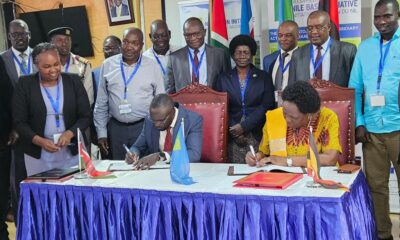News
ActionAid admits to misleading Ugandans over GMOs

Ugandan scientists have developed a GM banana to combat the devastating banana bacterial wilt. But NGOs such as ActionAid opposed the technology
The newspaper spoke to Fredrick Kawooya, the policy and campaigns manager at ActionAid Uganda, who said that the organisation was trying to mobilise opposition to the GM plant from farmers and the public.
“In our communication we use the simplest message you can take to the farmer to understand the risk,” Kawooya told The Independent.
“I am saying [to farmers] that eating GM food could potentially cause cancer. There is a photo of the rats that had cancer. Then I explain that research has been done and they used the rats and this was the result. We say because of the uncertainty we can also conclude that if this food is not safe and can cause it in rats, it can also cause it in the human. And that’s it. Research has been done.”
But scientists point out that the study referred to by Kawooya has been retracted by the journal that published it three years ago after it was criticised for its lack of statistical analysis, its ambiguous results and small sample size.
The newspaper further asked Kawooya whether he personally believed that GM food could cause cancer, but he was unsure himself: “You get arguments either way. There is an argument that has been presented and I suspect it might be true.” But this is rejected by scientists who say it is now established to be as safe as conventional breeding.
When The Independent contacted ActionAid UK and asked about Mr Kawooya’s comments, it immediately distanced itself from the campaign. In a statement, ActionAid UK said: “Thank you for letting us know that ActionAid in Uganda has been telling farmers that GM could potentially cause cancer.
“That should not have happened and has been stopped. ActionAid’s expertise lies in tackling rural poverty through the promotion of sustainable agriculture. As such, country programmes are asked not to take a position on the health impacts of GMOs… There remain very large concerns about the roll out of GM technology in poor countries.”
All major scientific bodies including the World Health Organisation, the American Food and Drug Administration (FDA) as well as the European Union office for Science have conducted extensive studies and determined that GM foods have “no effects on human health”.
The Independent’s investigation further reveals that the Ugandan arm of the Charity received £1.43m, (More than Ushs 6.3 billion) to support local programmes, among which was an aggressive campaign mounted over the past two years to block the passing of the Biotechnology and Biosafety Bill 2012.
Ugandan scientists who have been at the forefront of advocating the passing of a bill to regulate GM technology in Uganda confirm that their efforts to educate legislators as well as members of the public, particularly farmers, largely failed because of the poisonous and insidious messages from NGOs such as ActionAid.
Thanks to misleading messages by ActionAid and other NGOs in Uganda, the Science and Technology Committee of Parliament that was gathering views from stakeholders about the Bill, last year wrote a report in which it advised the government to withdraw the bill because of opposition from the public.
Scientists in Britain and Uganda say that ActionAid’s campaign was not an isolated incident and that some NGOs had been using “wildly inaccurate scientific allegations” as a campaigning tool to stop projects that could improve food security.
The Independent quoted Dale Sanders, Head of the John Innes centre for research and training in plant and microbial science, as saying: “I find it very sad that NGOs whose stated aim is to improve food security and prevent malnutrition should be making false suggestions that GM crops are any less safe than conventional breeding. GM technology offers huge potential to improve yields and combat disease in crops that millions of people rely on.”
Dr. Andrew Kiggundu, the Head of the Biotechnology Programme at the National Agricultural Research Laboratories (NARL) at Kawanda, told this reporter during a visit to Kawanda that the NGOs’ campaign in Uganda was overwhelming and influenced the withdrawal of the bill that was expected to be passed into law last year.
Besides the erroneous threat of cancer, the NGOs have been telling farmers that allowing GM technology would make them slaves of multi-national seed companies by making them dependent on bought seeds every planting season.
But this argument was countered, rather unsuccessfully, by scientists who argue that GM technology does not prevent farmers from using saved seed. Local scientists further stressed that majority of the GM crops they are working on such as Bananas and Cassava are not targets for commercialisation by any of the international seed companies because they are vegetatively propagated.
A number of scientists expressed dismay about the withdrawal of the bill calling it a major step backward into the country’s efforts to address serious agricultural and health challenges such as diseases, drought, soil fertility and micro-nutrient deficiencies such as iron and vitamins.
On the other hand, last year Nigeria joined five other African countries that approved the planting of GM crops.
Comments



















